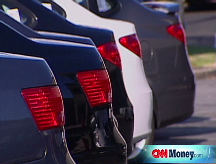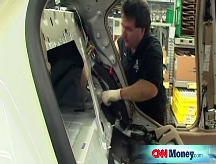Auto sales outlook: Running on empty
More bad news for Detroit. Rising unemployment is likely to keep a lid on demand for cars and trucks throughout 2009.
NEW YORK (CNNMoney.com) -- Detroit automakers are no longer in the driver's seat when it comes to their own recovery. The U.S. economy is.
No matter what further concessions the United Auto Workers union makes, what debt relief the automakers win in talks with creditors and what kind of additional federal help is made available, U.S. consumers have to start buying cars again.
And a rebound in sales will be difficult, if not impossible, to come by for General Motors (GM, Fortune 500), Ford Motor (F, Fortune 500) and Chrysler LLC as long as the unemployment rate keeps rising.
This Friday's jobs report is likely to show how difficult it will be for the Big Three to complete their promised turnarounds, even with billions of dollars in loans from the government.
Economists are forecasting a loss of 475,000 jobs in December. The outlook for employment for the rest of this year is similarly grim. The minutes of the most recent Federal Reserve meeting show that staff at the central bank expect the unemployment rate "to rise significantly into 2010."
Faced with this backdrop, independent auto analyst Erich Merkle said that even if auto sales bottomed out in early December, a month when all the major car manufacturers posted sales declines of at least 30%, it's not certain when there will be a sustainable rebound in demand.
"It's when we'll have a meaningful upturn, that is the big question. We could conceivably crawl along the bottom for some time," he said.
To that end, J.D. Power & Associates is now forecasting 2009 industrywide sales of 11.4 million vehicles for the year.
While that's up from the tremendously weak sales pace in the fourth quarter, it would be down 14% from the full year 2008 sales, and below the sales targets set by Ford and GM in their turnaround plans submitted to Congress.
It is clear that no automaker can make money with auto sales at currently depressed levels. Even industry sales and profit leader Toyota Motor (TM) has warned it is about to report its first operating loss as a public company.
Ford director of sales and industry analysis George Pipas said that Ford factored in lousy job reports when it presented its plans to Congress. But he added that it is possible industrywide sales could be better than expected, given that the Fed, Congress and the incoming Obama administration are all focused on stimulating the economy.
"When things are bad, the presumption is it will get worse or always be bad," he said. "That's no more correct than the assumption in good times that things will always stay good."
In fact, some economists are forecasting a much sharper rebound in auto sales than now being assumed even by the automakers. Joseph Carson, chief economist at AllianceBernstein, said industrywide sales should reach 13 million this year, and that second-half sales could climb to above a 14 million annualized sales rate.
He said the massive economic stimulus plan likely to be passed by Congress, coupled with low interest rates, should lead to a much stronger rebound than many are expecting.
"If you go back and look at the severe recessions of the mid '70s and early '80s, from the trough to one year later, car and truck sales were up 30%," he said.
Carson added that the sharp cuts in production by the automakers in the past year will also set the stage for an eventual recovery.
But others think auto sales won't be able to bounce back as fast this time given the depth of this recession.
Wilbur Ross, the private equity investor who is chairman of auto parts maker International Automotive Components Group, says that U.S. automakers should have been cutting production sooner.
Instead, he said they offered easy financing terms and cash back offers for too long in order to move cars at below cost. Those sales stole from future demand for their vehicles, he said.
"When you borrow from the future, eventually you run out of future," he said.
Because of that, Ross said the only way for the automakers to survive is to win further concessions from unions and creditors and shed excess dealerships. He is not predicting a major upturn in sales anytime soon.
"We don't know for how long we're likely to stay at these reduced levels," he said. ![]()






